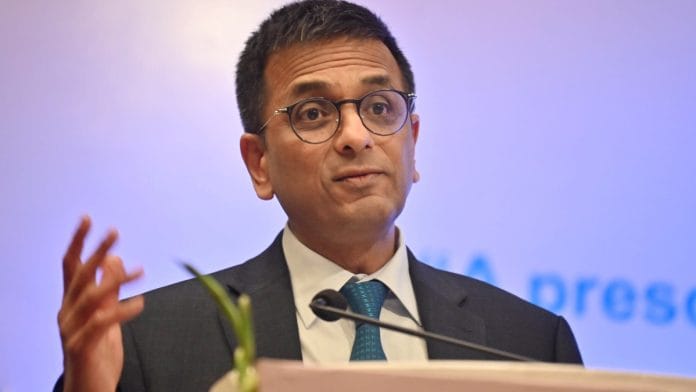New Delhi: Former Chief Justice of India D.Y. Chandrachud has said Article 370 was part of a chapter that “ultimately had to fade away”, and one does not have to be an “atheist to be an independent judge”, responding to a number of crucial judgments and controversies that occurred under his tenure.
In an interview with the BBC, as part of its HARDTalk programme, Chandrachud, who retired on 10 November 2024 after heading the top court for almost 2 years, also said that the Supreme Court delivered “judgments where we invalidated the law brought by the government”.
When asked about the 2023 Supreme Court judgment upholding the abrogation of Article 370, former CJI Chandrachud said, “Article 370 was a part of a Chapter, which is titled…Temporary and Transitional Provisions.”
“And therefore, at the birth of the Constitution, the assumption was this, what was transitional will have to fade away and have to merge with the overall text of the Constitution,” he added.
He emphasised that the Supreme Court had also set a timeline for restoring the democratic process in Jammu and Kashmir and elections were carried out in October 2024 in line with that direction.
That the dispensation in the Union territory is not the same as the Union government is evidence that “democracy has succeeded in Jammu and Kashmir”, former CJI Chandrachud further said.
When asked about the reorganisation of Jammu and Kashmir into two Union territories—Jammu & Kashmir and Ladakh—he said the court had accepted the “unconditional” undertaking from the Union government that Jammu and Kashmir’s status as a state will be restored “as soon as possible”.
Clarifying his statement made in October 2024, when he said that he sat before a deity to find the solution to the Ram Janmabhoomi-Babri Masjid dispute, he said, “That’s completely erroneous”.
“What I said was this…I make no bones of the fact that I am a man of faith. Our Constitution does not require you to be an atheist to be an independent judge, and I value my faith, but what my faith teaches me is the universality of religion and irrespective of who comes to my court…you dispense equal and even-handed justice,” he explained.
He added that his time in prayer and meditation was “important” to him and teaches him to be “evenhanded to every religious group in the country”.
Former CJI Chandrachud also dismissed the furore created by a viral video of Prime Minister Narendra Modi visiting Chandrachud’s house on the occasion of Ganpati Poojan, saying they were “elementary courtesies of Constitutional office” and had nothing to do with the way they dispose of cases.
Asked if he had effectively stood up to the executive, Chandrachud said, “Of course.”
Reaffirming his confidence in the durability of Indian democracy, Chandrachud said, “Our nation has emerged as a mature democracy. The last elections and the consistent pattern of elections across the states only go to remind you that the Indian democracy is stable.”
“Economic growth can take place in stable political conditions in a democracy and the onward path of India as an economic powerhouse is grounded in strong political traditions,” he said, adding that these traditions are safeguarded by political parties, a “vibrant” electorate, and ultimately the “Constitution which is enforced by independent courts governed by the rule of law”.
Asked if courts were facing political pressure, Chandrachud said the Supreme Court had worked to enhance liberty. “Last year, 21,000 bail applications were filed in the Supreme Court, the Supreme Court disposed of 21,300 bail applications,” he said, saying that this indicates that the “due process of law does govern”.
Among other questions, the former CJI answered, he argued that judiciary was becoming more gender-balanced.
“If you look at the lowest levels of recruitment to the Indian judiciary, the district judiciary, which is the base of the pyramid, over 50 percent of the new recruits coming into our states are women. There are states where the recruitment of women goes up to 60 or 70 percent,” said Chandrachud.
He dismissed the allegations that the Indian judiciary is dynastic, sharing that his father, former CJI Y. V. Chandrachud (1978-1985), had said that “he (D.Y. Chandrachud) would not enter a court of law so long he (Y. V. Chandrachud) was the Chief Justice of India”.
Most lawyers, he said, are first-time entrants in the legal profession.
Sneha Yadav is an intern with ThePrint.
(Edited by Sanya Mathur)







Mr. Chandrachud should not have agreed to the BBC interview in the first place.
The BBC is an ideologically indoctrinated organisation with a malicious intent vis-a-vis India. The BBC’s position on the Kashmir issue and it’s reportage on India over the last seven decades is proof of the same. Indians must stop providing patronage to this flatulent institution of British colonialism.